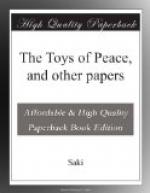“Do you think you left Louise there?”
“I might telephone and ask. Oh, Robert, before you clear the tea-things away I wish you’d ring up Mornay’s, in Regent Street, and ask if I left two theatre tickets and one niece in their shop this afternoon.”
“A niece, ma’am?” asked the footman.
“Yes, Miss Louise didn’t come home with me, and I’m not sure where I left her.”
“Miss Louise has been upstairs all the afternoon, ma’am, reading to the second kitchenmaid, who has the neuralgia. I took up tea to Miss Louise at a quarter to five o’clock, ma’am.”
“Of course, how silly of me. I remember now, I asked her to read the Faerie Queene to poor Emma, to try to send her to sleep. I always get some one to read the Faerie Queene to me when I have neuralgia, and it usually sends me to sleep. Louise doesn’t seem to have been successful, but one can’t say she hasn’t tried. I expect after the first hour or so the kitchenmaid would rather have been left alone with her neuralgia, but of course Louise wouldn’t leave off till some one told her to. Anyhow, you can ring up Mornay’s, Robert, and ask whether I left two theatre tickets there. Except for your silk, Susan, those seem to be the only things I’ve forgotten this afternoon. Quite wonderful for me.”
TEA
James Cushat-Prinkly was a young man who had always had a settled conviction that one of these days he would marry; up to the age of thirty-four he had done nothing to justify that conviction. He liked and admired a great many women collectively and dispassionately without singling out one for especial matrimonial consideration, just as one might admire the Alps without feeling that one wanted any particular peak as one’s own private property. His lack of initiative in this matter aroused a certain amount of impatience among the sentimentally-minded women-folk of his home circle; his mother, his sisters, an aunt-in-residence, and two or three intimate matronly friends regarded his dilatory approach to the married state with a disapproval that was far from being inarticulate. His most innocent flirtations were watched with the straining eagerness which a group of unexercised terriers concentrates on the slightest movements of a human being who may be reasonably considered likely to take them for a walk. No decent-souled mortal can long resist the pleading of several pairs of walk-beseeching dog-eyes; James Cushat-Prinkly was not sufficiently obstinate or indifferent to home influences to disregard the obviously expressed wish of his family that he should become enamoured of some nice marriageable girl, and when his Uncle Jules departed this life and bequeathed him a comfortable little legacy it really seemed the correct thing to do to set about discovering some one to share it with him. The process of discovery was carried on more by the force of suggestion and




